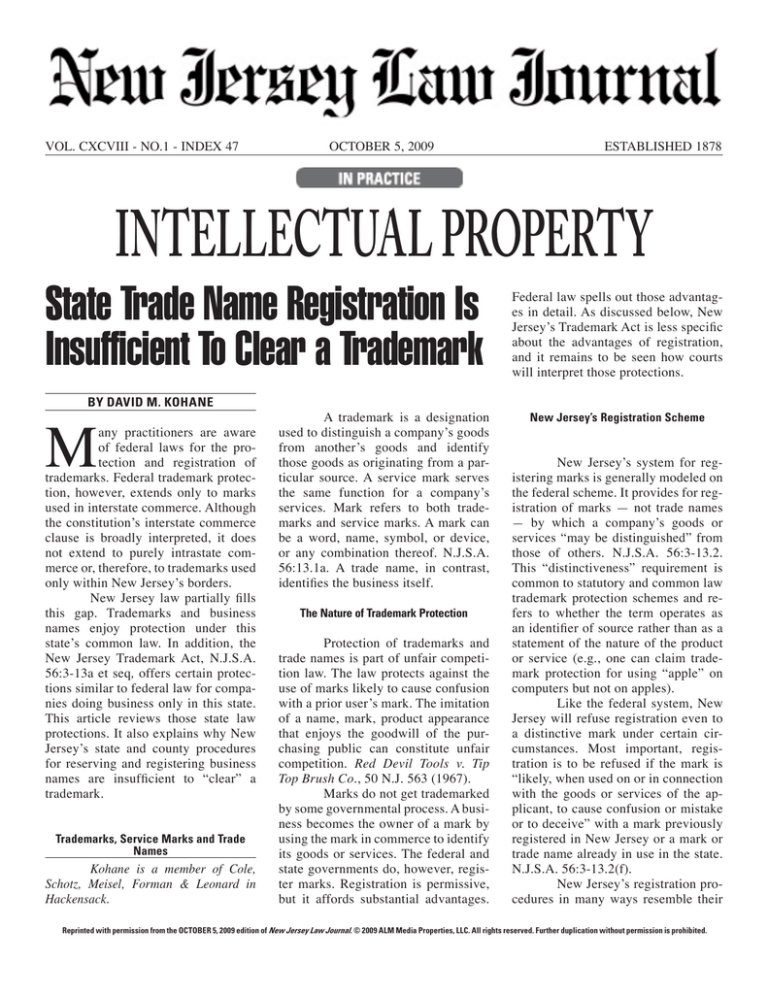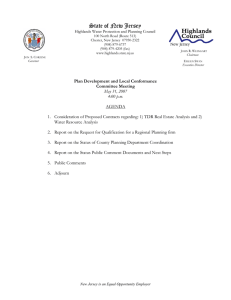
VOL. CXCVIII - NO.1 - INDEX 47
OCTOBER 5, 2009
ESTABLISHED 1878
INTELLECTUAL PROPERTY
State Trade Name Registration Is
Insufficient To Clear a Trademark
M
By David M. Kohane
any practitioners are aware
of federal laws for the protection and registration of
trademarks. Federal trademark protection, however, extends only to marks
used in interstate commerce. Although
the constitution’s interstate commerce
clause is broadly interpreted, it does
not extend to purely intrastate commerce or, therefore, to trademarks used
only within New Jersey’s borders.
New Jersey law partially fills
this gap. Trademarks and business
names enjoy protection under this
state’s common law. In addition, the
New Jersey Trademark Act, N.J.S.A.
56:3-13a et seq, offers certain protections similar to federal law for companies doing business only in this state.
This article reviews those state law
protections. It also explains why New
Jersey’s state and county procedures
for reserving and registering business
names are insufficient to “clear” a
trademark.
Trademarks, Service Marks and Trade
Names
Kohane is a member of Cole,
Schotz, Meisel, Forman & Leonard in
Hackensack.
A trademark is a designation
used to distinguish a company’s goods
from another’s goods and identify
those goods as originating from a particular source. A service mark serves
the same function for a company’s
services. Mark refers to both trademarks and service marks. A mark can
be a word, name, symbol, or device,
or any combination thereof. N.J.S.A.
56:13.1a. A trade name, in contrast,
identifies the business itself.
The Nature of Trademark Protection
Protection of trademarks and
trade names is part of unfair competition law. The law protects against the
use of marks likely to cause confusion
with a prior user’s mark. The imitation
of a name, mark, product appearance
that enjoys the goodwill of the purchasing public can constitute unfair
competition. Red Devil Tools v. Tip
Top Brush Co., 50 N.J. 563 (1967).
Marks do not get trademarked
by some governmental process. A business becomes the owner of a mark by
using the mark in commerce to identify
its goods or services. The federal and
state governments do, however, register marks. Registration is permissive,
but it affords substantial advantages.
Federal law spells out those advantages in detail. As discussed below, New
Jersey’s Trademark Act is less specific
about the advantages of registration,
and it remains to be seen how courts
will interpret those protections.
New Jersey’s Registration Scheme
New Jersey’s system for registering marks is generally modeled on
the federal scheme. It provides for registration of marks — not trade names
— by which a company’s goods or
services “may be distinguished” from
those of others. N.J.S.A. 56:3-13.2.
This “distinctiveness” requirement is
common to statutory and common law
trademark protection schemes and refers to whether the term operates as
an identifier of source rather than as a
statement of the nature of the product
or service (e.g., one can claim trademark protection for using “apple” on
computers but not on apples).
Like the federal system, New
Jersey will refuse registration even to
a distinctive mark under certain circumstances. Most important, registration is to be refused if the mark is
“likely, when used on or in connection
with the goods or services of the applicant, to cause confusion or mistake
or to deceive” with a mark previously
registered in New Jersey or a mark or
trade name already in use in the state.
N.J.S.A. 56:3-13.2(f).
New Jersey’s registration procedures in many ways resemble their
Reprinted with permission from the OCTOBER 5, 2009 edition of New Jersey Law Journal. © 2009 ALM Media Properties, LLC. All rights reserved. Further duplication without permission is prohibited.
2
NEW JERSEY LAW JOURNAL, OCTOBER 5, 2009
federal counterparts, including disclaimer of unregistrable components of
the mark and opportunities to contest or
appeal (to the Office of Administrative
Law) refusals. State registrations may
be cancelled on application of a third
party. N.J.S.A. 56:3-13.3-13.b.
There are, however, some differences between the state and federal
schemes. State registration is filed on
paper; federal registrations are usually
accomplished on-line. New Jersey has
no “Official Gazette” to publish pending applications for opposition and no
“Supplemental Register” for descriptive
marks that may acquire distinctiveness.
State registrations must be renewed every five years. N.J.S.A. 56:3-13.5. A
federal presumption of abandonment
through nonuse now arises after three
years, 15 U.S.C. § 1127; New Jersey
presumes abandonment after two years.
N.J.S.A. 56:3-13.1a.
A certificate of registration is
admissible to prove the registration in
New Jersey’s courts. N.J.S.A. 56:313.4. Unlike the federal statute, however, New Jersey’s statute says little about
what legal rights registration establishes. Where federal registration grants
federal registrants nationwide priority in
the use of the mark (15 U.S.C. § 1057),
the New Jersey Trademark Act makes
no explicit statement whether state registration grants statewide priority. Federal registration affords a presumption
of validity, ownership and exclusive
rights, 15 U.S.C. § 1057(b), 1115(a);
New Jersey’s Trademark Act does not
spell out that equivalent presumptions
arise from state registration. The act
leaves these issues to the courts, but it
does provide some guidance. It states
it is intended to “provide a system of
state trademark registration and protection substantially consistent with the
federal system of trademark registration and protection” and instructs that
federal law is “persuasive authority” in
interpreting New Jersey’s act. N.J.S.A.
56:3-13a.
Regardless of how these issues are decided, New Jersey registration can deter infringers and establish
a mark owner’s dedication to protecting its mark, helping avoid disputes and
litigation. For small businesses without
an interstate nexus, New Jersey registration can be a relatively inexpensive
way to enhance a mark’s value.
New Jersey Statutory Trademark Remedies
The New Jersey Trademark Act
includes remedies for infringement of
both registered and common-law marks
similar to those afforded by federal law.
The owner of a mark may bring a civil
action, for example, against persons
who use any “reproduction, counterfeit,
copy or colorable imitation” of a mark
in a way “likely to cause confusion or
mistake or to deceive as to the source
of origin of the goods or services.”
N.J.S.A. 56:3-13.16.a.
Remedies can include injunctive relief, destruction of goods or
materials bearing infringing marks,
disgorgement of profits and damages.
Treble damages and attorneys’ fees are
available, in the court’s discretion, if
the infringement was knowing, in bad
faith or “egregious.” N.J.S.A. 56:3-13.16.d. Under specified circumstances,
the court may order ex parte seizures
and injunctive relief of goods bearing
counterfeit marks. The statute authorizes the attorney general to intervene
if the infringement poses a threat to
the public health, safety or welfare.
N.J.S.A. 56:3-13.16.c.
New Jersey also has an “unfair competition” statute that protects
marks, business names and a business’s
goodwill. N.J.S.A. 56:4-1 prohibits
the appropriation of another’s “name,
brand, trade-mark, reputation or good
will….” The statute authorizes injunctive relief and damages; the court may
award treble damages in its discretion.
N.J.S.A. 56:4-2.
Federal law often relies on multifactor tests to determine when marks
are confusingly similar and therefore
infringing. New Jersey’s test is substantially the same. Buying for the Home,
LLC v. Humble Abode, LLC, 459 F.
Supp.2d 310 (D.N.J. 2006); American
Home Mortgage Corporation v. American Home Mortgage Corporation, 357
N.J. 273 (App. Div. 2003).
Finally, New Jersey’s stat-
198 N.J.L.J.47
ute prohibits use of a “famous” mark
that “causes dilution of the distinctive
quality of the owner’s mark.” N.J.S.A.
56:3-13.20. The protection is somewhat
narrower than current federal protections. New Jersey’s statute prohibits
dilution of the distinctive quality of
a mark (“blurring”); federal law protects against blurring but also protects
against “tarnishment” of a famous mark
through use of the defendant’s mark on
goods or services of lesser quality. Unlike federal law, furthermore, New Jersey’s statute requires actual dilution, not
just a likelihood of dilution. 15 U.S.C.
§ 1125(c).
Registering a Trade Name Does Not “Clear” It
for Trademark Purposes
A common misconception is
that registration or reservation of a trade
name protects against a charge of trademark infringement. The willingness of
the county clerk (for sole proprietorships and general partnerships) or the
state (for corporations, limited liability
companies and limited partnerships) to
register or reserve a name does not give
the registrant the trademark or ensure
that a business’s name will not infringe
another business’s mark or trade name.
Although the statutes provide
that a corporation, limited liability company or limited partnership may only
register its actual name if it will “distinguish it” from another company’s name,
for example, a company can register an
alternate name regardless of whether the
name will “distinguish it” from another
company’s name. N.J.S.A. 14A:1-2.1,
42:2A:6.1, 42:2B-4.b. The divided
state/county system for registering and
reserving trade names does not provide
for cross-checking of state and county
records. The trade name registration/
reservation process also does not check
for registrations and uses of marks and
names outside New Jersey or for unregistered uses of marks with common-law
protection. Generally speaking, therefore, a trademark search is needed to
“clear” a name or mark for trademark
purposes — preferably before a company invests time, money and effort to
develop goodwill in the mark.■

